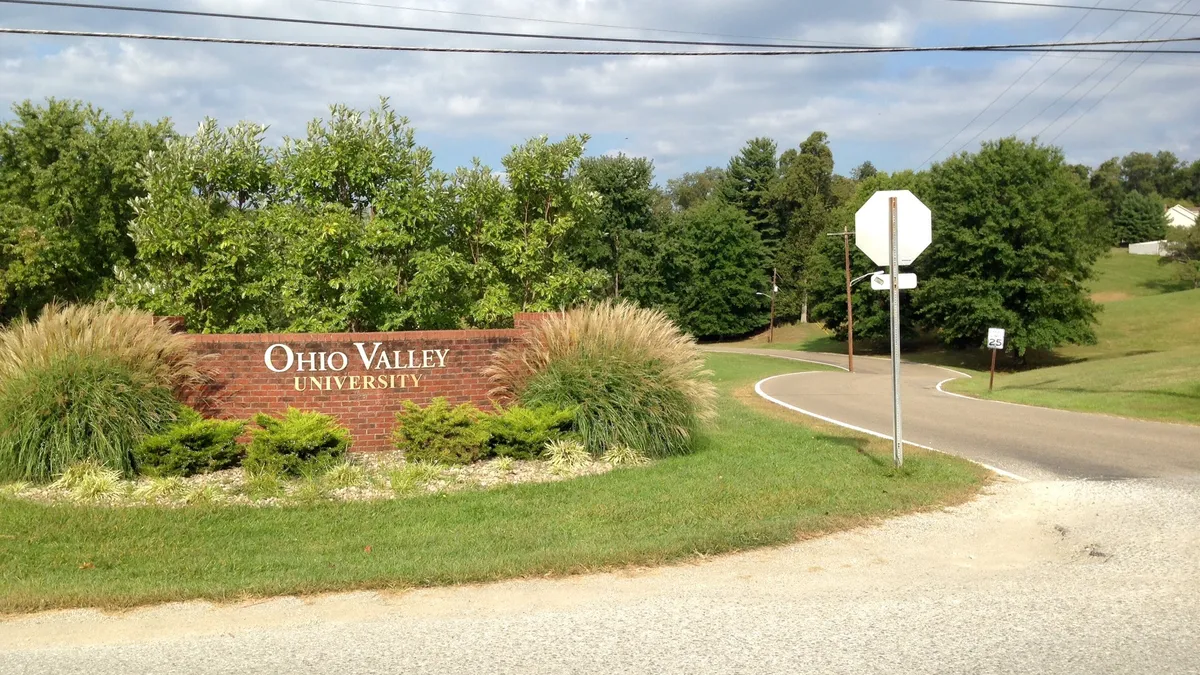Ohio Valley University, a nonprofit Christian college in West Virginia, is planning to close after years of mounting financial difficulties. It will not be holding classes in the spring term, its president told the state's higher education commission Tuesday.
The decision came ahead of a planned vote this Friday by the West Virginia Higher Education Policy Commission that could revoke the university's ability to award degrees.
"We find ourselves in an extremely difficult financial situation and know that we have work to do to complete the current semester," Ohio Valley President Michael Ross wrote in a letter to the commission. "We do not make this decision lightly and realize the work ahead to meet the needs of our students is a priority."
Ohio Valley has faced mounting financial difficulties over the past few years, with enrollment slipping from 560 students in fall 2017 to just 273 students three years later, according to federal data. The issues came to a head in 2020, when Ohio Valley's accreditor, the Higher Learning Commission, placed the school on probation for not meeting the agency's requirements for colleges to have enough resources to support their educational programs.
In recent months, the college hasn't been paying its employees or providing students with their academic transcripts, according to West Virginia Higher Education Policy Commission documents.
Ohio Valley sits at the nexus of several trends that are hitting small religious schools.
These schools have struggled to maintain and grow enrollment, said Michael Horn, a distinguished fellow and cofounder at the Clayton Christensen Institute for Disruptive Innovation. The number of traditional college-age students is expected to shrink in many U.S. regions this decade — a trend that some institutions are already beginning to feel. And nonselective schools have struggled to attract students during the pandemic.
"It sounds like it's three things hitting them at once that caused them to not meet payroll for the last several months," Horn said.
A handful of similar Christian colleges have fallen victim to these trends in recent years.
Martin Methodist College was renamed University of Tennessee Southern this summer after the 151-year-old Christian school was acquired by the University of Tennessee System. The institution agreed to the acquisition after experiencing flagging enrollment. Holy Family College, a Roman Catholic institution in Wisconsin, closed at the end of the 2020 summer term, citing financial challenges worsened by the coronavirus pandemic.
Ohio Valley has likewise been hemorrhaging students and heavily discounting tuition to attract new learners. It's also had poor student retention rates, leading to further enrollment declines.
"It sounds like it's three things hitting them at once."

Michael Horn
Distinguished fellow and cofounder, Clayton Christensen Institute for Disruptive Innovation
An audited financial statement for the 2019 fiscal year expressed doubt that Ohio Valley would be able to continue operating over the next 12 months because of recurring operating losses and significant cash flow issues.
In the 2019 fiscal year, the school received $8.1 million in tuition and fees but spent $4.9 million on discounts for students, representing a 60.4% tuition discount rate. That rate was well above the 46.3% average discount rate for undergraduates at private nonprofit colleges in the 2018-19 academic year, according to data from the National Association of College and University Business Officers.
The audited financial statement said the school was taking several steps to right its finances, including planning to bring its discount rate from around 60% in 2019 to 45% by 2023. It also mentioned the January 2019 appointment of Ross, who it says understands the economic necessity of living within the school's resources.
However, the college's finances continued to suffer under the new leadership, drawing the attention of the Higher Learning Commission, which placed the school on probation in June 2020. Ross did not respond to Higher Ed Dive's request for comment Wednesday.
The letter explaining the accreditor's decision cites the school's enrollment challenges, which it partly chalked up to retention issues. It noted the school had only 233 students in spring 2020 and saw a 17% decline in undergraduate students from the prior fall term. It also said the school projected an increase in enrollment "without sufficient evidence of strategies that can lead to improvement."
Although the enrollment declines were contributing to Ohio Valley's financial issues, the letter cites troubles beyond headcount decreases. The college was also missing debt payments, and its plans to secure new pots of funding weren't expected to pay off for years.
"Being realistic about where you are and your prospects earlier rather than later to protect the interest of students, I think, is incredibly important."

Michael Horn
Distinguished fellow and cofounder, Clayton Christensen Institute for Disruptive Innovation
A spokesperson for West Virginia's Higher Education Policy Commission said the possibility of revoking Ohio Valley's ability to award degrees remains on Friday's meeting agenda.
The school's accreditor, meanwhile, is working with the state agency and the U.S. Department of Education to coordinate help for students affected by the closure, according to a spokesperson.
The Higher Learning Commission has not approved any formal teach-out agreements but is reviewing documentation "very recently submitted by the institution," Heather Berg, the Higher Learning Commission's director of communications and strategic projects, said in an email.
The sudden mid-year closure is extremely unusual in higher education among private nonprofit institutions.
Horn said it was striking how quickly the college is closing, with seemingly little notice for students. Ohio Valley's president told West Virginia's higher ed commission Tuesday that the school was alerting students and employees about the closure that afternoon.
Mount Ida College, a small liberal arts school in Massachusetts, similarly announced in early 2018 that it was closing at the end of the spring term. The decision left roughly 1,400 students scrambling to figure out how to complete their education. The abrupt closure spawned a class-action lawsuit against the institution, which has since been dismissed, and heightened monitoring of the financial health of private colleges in the state.
Ohio Valley's closure serves as "another warning" that struggling schools shouldn't wait for a miracle to help them survive, Horn said. "Being realistic about where you are and your prospects earlier rather than later to protect the interest of students, I think, is incredibly important."



















